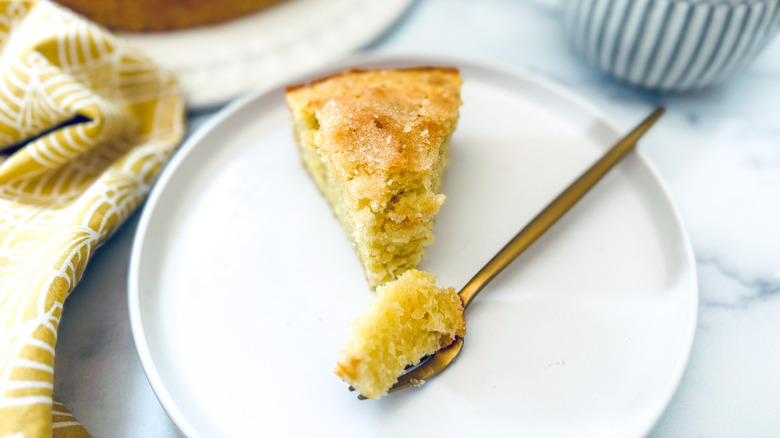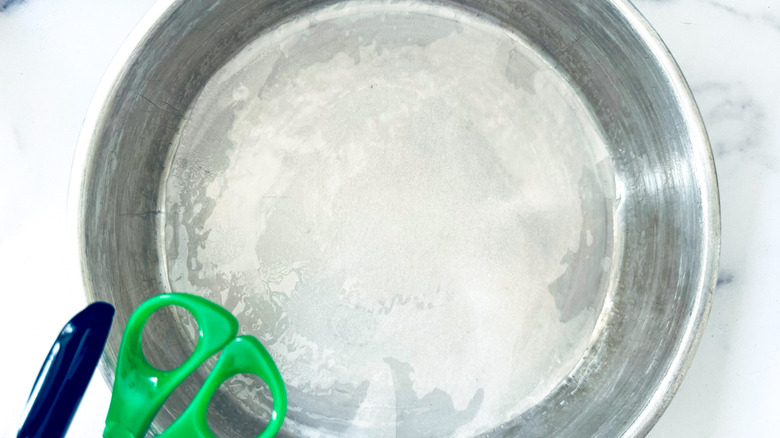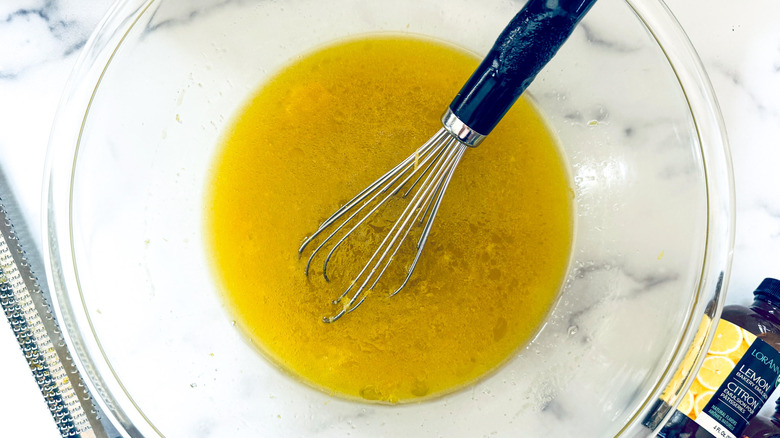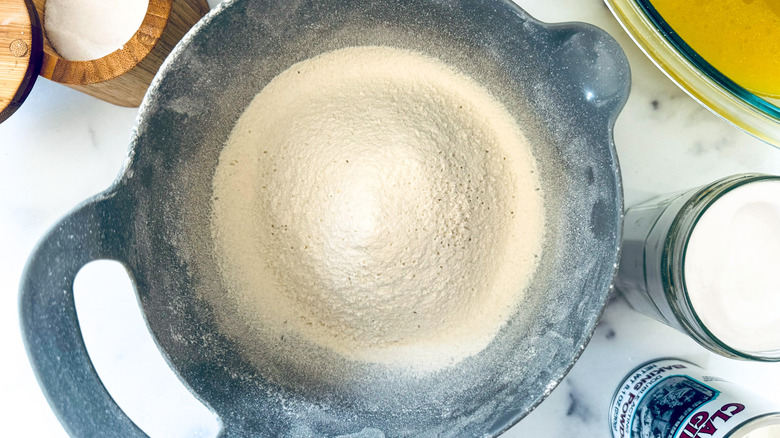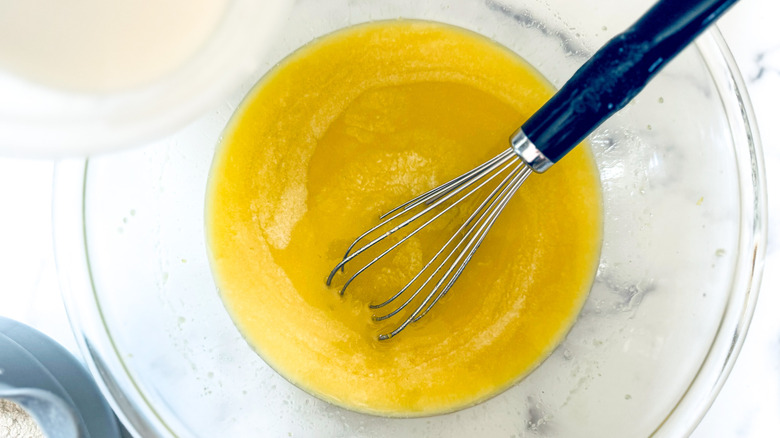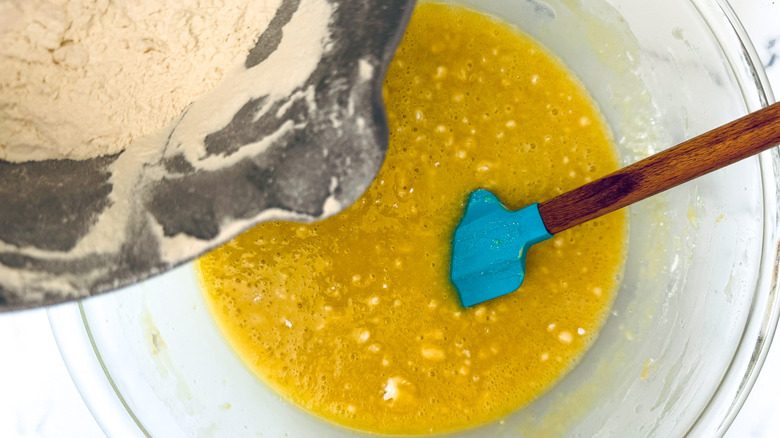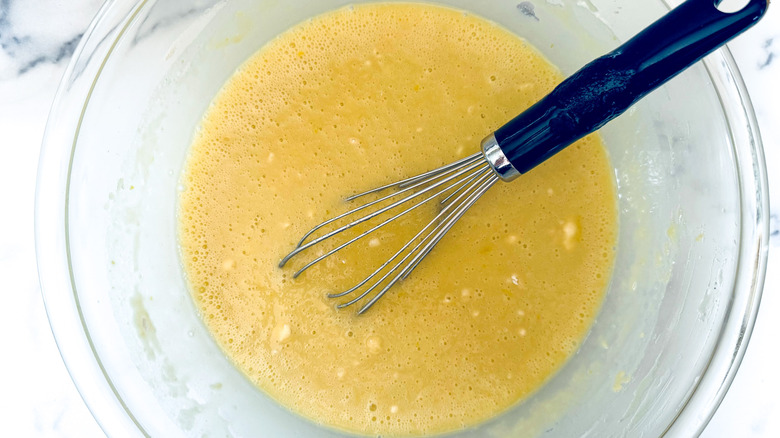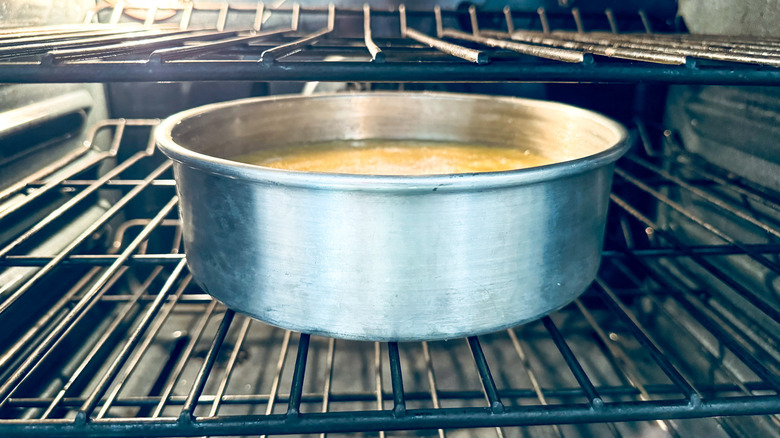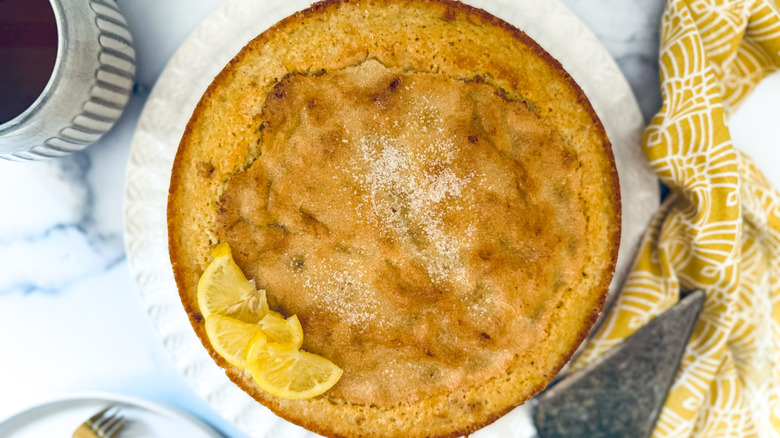Lemon Olive Oil Dump Cake Recipe
Having a couple of easy cake recipes in your repertoire is a great way to ensure that a sweet treat is always within arm's reach. While you can pick up a slice or a whole cake from a bakery, there's nothing like a home-baked version. Daily Meal recipe developer Deniz Vergara shares this lemon olive oil dump cake recipe that doesn't require much technique besides dumping ingredients into a bowl and mixing. Pour the citrusy batter into a pan to bake, and before you know it, you'll have a full-sized cake to serve ... or devour.
"You will fall in love with this lemon olive oil dump cake," Vergara guarantees, saying, "It's perfectly moist and tender with a bright lemon flavor and an addictive, crunchy sugar topping." The contrasting textures highlight the sweet and tangy taste that makes this cake an all-around winner whether you have a sweet tooth or not. Vergara adds, "It's perfect to enjoy with a cup of coffee or tea, and it is unbelievably easy to make!"
Gather the ingredients for this lemon olive oil dump cake recipe
For this recipe, get extra-virgin olive oil, large eggs at room temperature, granulated sugar, lemon extract, almond extract, lemon zest, fresh lemon juice, sea salt, baking powder, baking soda, all-purpose flour, and milk.
Step 1: Preheat the oven
Preheat the oven to 350 F.
Step 2: Prep a cake pan
Prepare a 9-inch pan by greasing the bottom and the sides well and lining the bottom with a circle of parchment paper.
Step 3: Combine oil, eggs, sugar, lemon, and extracts
In a large mixing bowl, whisk together the olive oil, eggs, 1 ⅓ cups sugar, lemon extract, almond extract, lemon zest, and lemon juice until fully combined.
Step 4: Combine the dry ingredients
In a medium-sized bowl, sift together the salt, baking powder, baking soda, and flour.
Step 5: Add milk to the wet ingredients
Add half of the milk to the wet ingredients and whisk thoroughly.
Step 6: Start combining wet and dry ingredients
Then, add half of the dry ingredients to the wet ingredients.
Step 7: Repeat until the batter is mixed
Repeat the process to add the remaining milk and dry ingredients, being sure not to overmix.
Step 8: Transfer to a pan
Pour the batter into the prepared pan.
Step 9: Top with sugar
Sprinkle ¼ cup of granulated sugar evenly over the top.
Step 10: Bake
Bake for 50–55 minutes, until the cake is risen and is starting to turn a bit golden brown on the top.
Step 11: Cool
Remove from the oven and allow to cool for about 10 minutes in the pan.
Step 12: Flip the cake
Gently flip the cake onto a plate or cutting board, remove the parchment paper, and flip again so that the crunchy sugar is on top.
Step 13: Cool and slice
Allow to cool fully before slicing.
What type of olive oil works best for baking cake?
Given that this cake contains 1 cup of olive oil and features the ingredient in its name, it's no secret that olive oil is fundamental to the recipe. As such, you'll want to ensure you use a quality product for optimal results. Vergara emphasizes this fact and explains, "It is important to use high-quality extra virgin olive oil for this recipe so that the flavor will come through."
If the recipe only called for a fraction of oil, any olive oil would be fine as it would not impart much to the overall taste. However, since its presence is more notable, as both a flavoring agent and as a moistening element in the cake, it's essential to choose a product that tastes good and brings the right qualities to the batter. Skip the simple olive oils and reach for extra virgin options. Within this category, you can find oils with more pungent herbal notes and others on the fruitier end of the spectrum.
How can this olive oil dump cake be adapted?
Olive oil and lemon work wonderfully together, whether you're seasoning a leafy green salad or making a cake. However, once you try this recipe, you may want to experiment with other profiles. Citrus brings a lot to the table here, so to keep in line with those flavor notes Vergara suggests swapping lemon juice and zest for orange juice and zest. This will add a warmer and sweeter element to the taste and tame the tanginess.
Meanwhile, if you're fond of the lemon content and want to switch up the flavoring extracts, she recommends using vanilla extract instead of almond extract. This substitution will bring a fragrant warmth to the cake and give it a classic, vanilla aroma that's always welcome in a baked good. Consider garnishing the cake with candied citrus peels for a stunning presentation alongside the sugary topping.
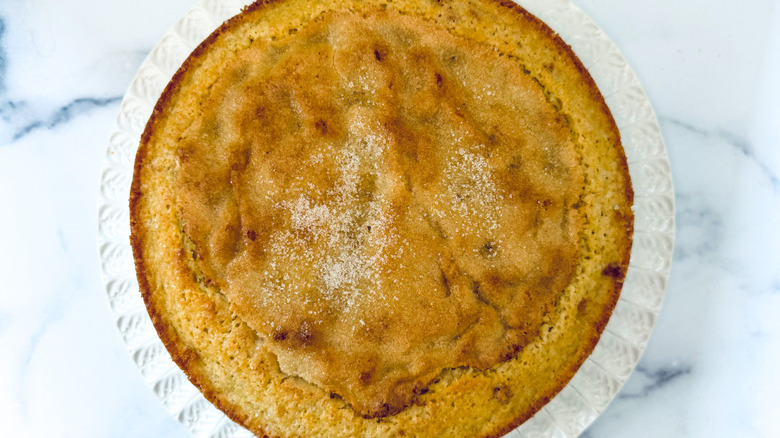
- 1 cup extra-virgin olive oil
- 3 large eggs, room temperature
- 1 ⅓ + ¼ cups granulated sugar, divided
- ½ teaspoon lemon extract
- 1 teaspoon almond extract
- 2 lemons, zested
- ½ cup fresh lemon juice
- 1 teaspoon sea salt
- ½ teaspoon baking powder
- ½ teaspoon baking soda
- 2 cups all-purpose flour
- ½ + ½ cups milk, divided
- Preheat the oven to 350 F.
- Prepare a 9-inch pan by greasing the bottom and the sides well and lining the bottom with a circle of parchment paper.
- In a large mixing bowl, whisk together the olive oil, eggs, 1 ⅓ cups sugar, lemon extract, almond extract, lemon zest, and lemon juice until fully combined.
- In a medium-sized bowl, sift together the salt, baking powder, baking soda, and flour.
- Add half of the milk to the wet ingredients and whisk thoroughly.
- Then, add half of the dry ingredients to the wet ingredients.
- Repeat the process to add the remaining milk and dry ingredients, being sure not to overmix.
- Pour the batter into the prepared pan.
- Sprinkle ¼ cup of granulated sugar evenly over the top.
- Bake for 50–55 minutes, until the cake is risen and is starting to turn a bit golden brown on the top.
- Remove from the oven and allow to cool for about 10 minutes in the pan.
- Gently flip the cake onto a plate or cutting board, remove the parchment paper, and flip again so that the crunchy sugar is on top.
- Allow to cool fully before slicing.
